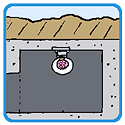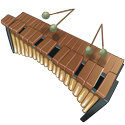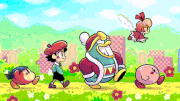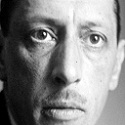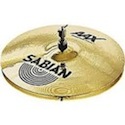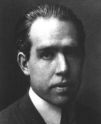|
When hunger I drink a bottle of cola -> eat something fatty -> listen to salsa for motivation -> practice.
|
|
|
|

|
| # ? Apr 26, 2024 11:11 |
|
Man I really want to buy a PBone. I know someone would probably kill me if they saw me playing it but it's just so pretty and
|
|
|
|
(preface: I'm a drummer/orchestra percussionist) So I recently discovered that instead of reading sheet music every time I play it, I kinda just ingrain it into my muscle memory, and then glance for differences/key triggers to know what I should play. How can I fix this major fuckup?
|
|
|
|
That's a gently caress up?
|
|
|
|
Jazz Marimba posted:(preface: I'm a drummer/orchestra percussionist) In my tradition the music is generally all memorized anyway (for percussionists too) but they are still concerned with this issue. It is generally solved by attaching every note and percussion stroke to a short, normally monosyllabic word, similar to solfege in Western music. So like, for melody in the West we have Do Re Me etc. In Indian music its Sa Re Ga Ma Pa Dha Ni Sa, and they learn and memorize all of the melodies by committing verbal strings of these notes to memory. They do it for rhythm too, its called taal theka. So on the tabla, for instance, there are tons of different ways to hit the drum to get a different sound or timbre, just like a drum kit. Like a hand slap on the left will be a ka, an open note strike a ga, right hand rim hit a ta, etc. Point being that they'll then remember their rhythmic routines and fills as combinations of these words, and have them memorized much like a poem. That way they both know exactly what is they're supposed to be playing and tell if they're wrong, but also, no sheet music. In performances they'll also occasionally use it by reciting a combination of bols/words extemporaneously and then replicating it exactly on their drums. That may not be all directly relevant to you, and what you're doing might not necessarily be a mistake, but I just wanted to share how one classical tradition addresses that issue.
|
|
|
|
Hmm, I haven't done that further than choosing sounds for things and...essentially beat boxing, haha. The problem is that since I don't fully read the music, when I come across new stuff I either can't play it (most common) or I miss parts that have subtle differences (e.g. the 11th measure of the Imperial March...not a common thing). Basically, I'm really good at reading stuff I already know, and I suck at sight reading. How do I get better at sight reading?
|
|
|
|
Jazz Marimba posted:Basically, I'm really good at reading stuff I already know, and I suck at sight reading. How do I get better at sight reading? I'm from a different instrument and world entirely but I generally just try and sight read something all the drat time. I'll pull random crap from the library that may or may not be for my instrument and play it down recording it (this is a thing I do so I can go back and look at my accuracy). Honestly I think the answer to get better at sight reading is more sight reading. I like to give myself a timer of 2 minutes to look at the piece before I start playing.
|
|
|
|
Think I've discovered the "perfect" amount of bow hair contact for each string. C and G, full width. D, 2/3rd. A, 1/3rd. Except with my bow using anything less than full width means inviting more bow bounce. (There should be a bow replacement fund for those with lovely enough bows) As for sight reading.. the only way of getting better that I'm aware of is sight reading. Good sight reading material is pretty much anything that doesn't offer you much technical difficulties so you can focus on playing as you read it. I'd recommend spending quite a bit of time on it every day, it's an extremely valuable skill to have.
|
|
|
|
In addition to just sight reading music more, there is a very neglected point about how to read music better. It's to know the elements of music and how it's constructed and focus on them separately. Early on, when I was first learning how to sight read, even the simplest exercises and pieces were too hard for me. I was told to start at a slow enough tempo that I could play through without mistakes and keep going, but I would set the slowest tempo imaginable in my head and still gently caress up very quickly. It was a painful, boring and miserable chore that seemed to go nowhere and drained all of my concentration away. It also made me conclude that reading was loving impossible the way it was being taught to me and I was better off spending that time working from ear and muscle memory to make progress in whatever pieces were being thrown at me. Then I discovered that this approach is actually retarded. If you think about it, a piece of music no matter how simple is actually a lot of elements combined. Here's a possible list: 1) Reading the pitches on the clef very well. 2) Knowing and recognizing the many (but still practically finite!) rhythmic patterns that they fall into, both visually on the staff and how they feel / sound in your mind 3) There are potentially two lines going on at once in different clefs - it's like reading two sentences of English at once 4) Not just 'knowing' but actually fully comprehending the key and time signatures in terms of practically playing in them 5) The challenge of playing your instrument in real time while negotiating with technique and all of the other millions of issues that come with this, WHILE your brain is occupied with all that previous poo poo. And that's just to play it at all, let alone with any of the other markings on the score, and let alone in any realistic context at the right tempo on demand in a way that could actually be called making music. This is very loving hard to do, and I think trying to do it right off the bat is silly. Why they would have anyone start with a full piece of music, no matter how simple, is beyond me. I actually got better at reading by studying theory first. In first semester theory, we studied the elements of music (clefs, time signatures, pitch notation, keys and key signatures, melody, harmony, tempo, rhythm, etc.), ear training (which involved interval identification, melodic dictation, rhythmic dictation, sight singing, and rhythm reading), and basic harmonic theory involving SATB voice leading. It was a very vigorous and challenging class but actually, I found that whole class to be a lot easier and less painful then trying to sit through and sight read even one piece of easy / intermediate music, because it was being presented in manageable chunks and built from the ground up. And I could learn it all separate from the complications of instrumental technique. When I joined the Chorale, I couldn't sight sing for poo poo initially and I am still very terrible (because it still requires controlling an instrument that I had never used my whole life) and so I was tempted to fall into learning by ear and memory which I actually did for awhile. It was very stressful because I would spend hours and hours memorizing all of the music and if my memory ever failed me or I got tripped up on a transition or awkward next note, I would be hosed. Because of my hard work I was still able to be one of the better singers. However, what allowed me to improve was taking a sight singing class where before singing any melodies we drilled the hell out of scales and learning how to hear notes in relation to the scale, to the triad, and to the dominant chord. We also looked only at rhythms for a long time. So, instead of putting a Vivaldi movement in front of me (which is what Chorale did) I got focused practice on the elements that make up sight singing. Put all of this together, and with barely practicing sight reading at all for my instrument (piano), I can now sit down with a new piece of music and do much, much, much better. I can sight read right hand melodies from Bach's two-part inventions and randomly throw in the left hand where it's straight forward to do so. For homophonic pieces (chords + melody), I can sight read early / intermediate pieces at a slow tempo. With singing, I can see something and holy poo poo, I can actually sing along and get most of the notes right. Having never had sung in a choir and being alongside people who have been sight singing their whole lives, I'm was like LMAO this poo poo is so loving easy when you can just read the music. Step once into my nightmare world where I spend hours memorizing and you just sit here reading a page and hearing the notes already. How was it possible? Because I focused and worked on all of these disparate chunks one at a time, and now instead of figuring out 10 things at once when sight reading, 80% of it is worked out already and the other 20% is negotiating the technique of being able to put your hands here or there or tell your vocal chords to do this, which makes it realistic NOW to start learning to sight read easy pieces and exercises. So yeah. Just to even play simple music is, in my opinion, a ridiculous goal for a bad or new reader. Until you know all the basic rhythmic patterns, until you can tell the inversion of a triad on staff paper with just a glance, and until you can read music in terms of logical sentences and chunks instead of one note at a time, you will never even be able to START learning to sight read. And always, a complete musical education is a must, even if you just get a little dab of theory and this or that. You can't be a successful instrumentalist if all you do is just play an instrument. Seriously. CowOnCrack fucked around with this message at 07:58 on Oct 21, 2013 |
|
|
|
Sight reading is something that I was able to conquer early on thanks to my first private teacher having an entire book of excerpts for it. Every lesson he'd pick one out, act like it was an actual audition by giving me less than a minute, and then just play through it. If you do sight read practice, the most important thing is to never play any exercise more than once. This may seem obvious, but it's important to keep cycling through different styles as well, and not just play excerpts that are all technical or all lyrical. I used to have this big book of specific sight reading exercises, but for the life of me, I can't find it or remember where I got it. On a different topic, I just took an audition a few days ago, and wanted to get some opinions on something. I went in fully prepared and had the excerpts that were requested down to the tee; but as happens every time I get in the room/auditorium, my mind completely shuts down and an extreme amount of nerves start to sink in. For those who have taken multiple auditions - I should specify that these are orchestral auditions - what do you recommend for nerves? I've played in front of my peers a lot before, and have even organized mock auditions myself, but I can't seem to shake the feeling when it comes time to actually make it count. Is there anything I can do to better prepare outside of just taking more and more? Believe me, that's something I'm prepared to do, and am already pretty much in the process of doing.
|
|
|
|
In my own experience I've found that good sightreading is mostly just being able to recognize common patterns in notes and rhythms. I teach little middle schoolers so I am constantly drilling rhythm patterns with them (and how to read them), because then when they come across those same patterns in new music, they can immediately apply their knowledge. Drilling scales, arpeggios, and other common note patterns is useful too. I think it can help a little bit too to practice sightreading pieces that are all from or inspired by a certain era. Don't skip around too much or you won't pick up on the common techniques. Like, when I pick up a Mozart piece I already have a pretty good idea of the kind of rhythmic and melodic patterns I will have to perform. Oh, and buying a book of music that's about a step down from your current level is good for sightreading practice. To me, if the music in a book looks easy, but fun to play, that's perfect sightreading practice. Re auditions, the thing that helped me most was being on the other side of it. Whenever I get nerves it's always the super anxious and unreasonable thought that I am just wasting the auditioner's time, and they hate me now, and they will tell all their friends to never hire me because I suck. But I've auditioned people now, and realized that even when someone made a huge nervous fuckup, I wasn't mad, I was kind of rooting for them to pull themselves together and keep going. I don't know if that's helpful or just my own personal weirdness though.
|
|
|
|
InterrupterJones posted:
I've heard good things about busking, depending on your instrument of course.
|
|
|
|
InterrupterJones posted:On a different topic, I just took an audition a few days ago, and wanted to get some opinions on something. I went in fully prepared and had the excerpts that were requested down to the tee; but as happens every time I get in the room/auditorium, my mind completely shuts down and an extreme amount of nerves start to sink in. For those who have taken multiple auditions - I should specify that these are orchestral auditions - what do you recommend for nerves? I've played in front of my peers a lot before, and have even organized mock auditions myself, but I can't seem to shake the feeling when it comes time to actually make it count. Is there anything I can do to better prepare outside of just taking more and more? Believe me, that's something I'm prepared to do, and am already pretty much in the process of doing. I've had good luck (not just in auditions, in performing) distracting myself from listening to myself (?probably poor wording?) by singing the tune in my head as I want it to sound. This is a technique one of my teachers gave me, and it's worked wonders from me. It lets me focus on what I want to hear, and hearing something is a good part of the battle for me. Also audition always. Audition for everything. Call in random people you don't know to listen to you blind. Perform always. Never stop performing. On the other side of the audition process (I'm posting from the high school audition point of view, and poo poo is probably way different up higher), fuckups are usually expected. I help out at a few area high schools and generally help out with brass placement tests. Hawkgirl covered it, but honestly I'm not as concerned when someone fucks up as it is how they recover. poo poo, if they gently caress up and recover that tells me that they're able to pickup when they inevitably get out of time when playing. I'm also a bit odd in that note accuracy isn't very high up in my priorities when I listen to auditions, and I focus more on tone quality and overall affect of the performance. I'm probably broken.
|
|
|
|
Don't worry, if you can conquer nerves in some situations you can do so in all situations! You just need to practice those situations as often as you can. Just be careful about auditioning for everything because you might get in! I've just started succeeding in working on my own nerve problems. It took some time to figure out what my main problem was while performing - staying focused. The solution I found is to keep my mind busy with planning the piece out and consciously thinking ahead of the music. If I let that inner dialog go silent, it's replaced by anxiety instead, which isn't very helpful for staying on task. This is similar to TheBandOffice and his tunes. I think this problem of not being focused comes from my 'unconscious practice playing habits' that I had before I switched to intensely focused practice which I describe in an earlier post. After doing this and thinking about some previous bad performances, the problem and it's solution became clear. Before in performances I had let muscle memory go and do it's thing, as in practice. Now I am thinking intensely about what I am playing all of the time. Where am I going next? Where are the trouble issues that I can take time on, and where are the parts where I can chill and shape the music more? Just by keeping my mind thinking about these things, I avoid having that space filled entirely by anxiety. Also, I really recommend thinking about the audience listening and being moved and motivated to make their experience as enjoyable as possible. When practicing for hours and hours, it's easy to get sucked into playing for yourself. Instead, always imagine there is some every day person (or perhaps someone you care deeply about) listening to your playing and try to make it as wonderful as you can for them. This also gives you something else wonderful to think about. For myself, it would have been nice to figure out these problems sooner, and I think if I were teaching a performance class I would have students perform every day so they can try more solutions and learn from mistakes. The Jazz combos for example around here are all very comfortable on stage because they perform dozens of times a semester, whereas a classical soloist performs just twice in class so there is this added pressure both of getting it right and knowing you have just one opportunity to work on performance anxiety.
|
|
|
|
I've been trying to track down a piece of sheet music for awhile, so I'll post it here. I am either looking for a Symphony orchestra or Wind symphony arrangement of L'Internationale. I have a string orchestra arrangement, but it seems impossible to track down this tune. I've exhausted my resources on this search, but maybe someone can point me in the right direction? I could do my own arrangement but I know there has to be something out there.
|
|
|
|
TheBandOffice posted:Man I really want to buy a PBone. I know someone would probably kill me if they saw me playing it but it's just so pretty and They sound way, way better than a plastic instrument has any right to. It's witchcraft. InterrupterJones posted:what do you recommend for nerves? This book: Golf is Not a Game of Perfect Yes it's a golf book, but the parallels between that game and performance should be plain to see. The book also uses way less vulgar language than I'm about to. The chief cause of anxiety in auditions is those guys sitting across the room/behind the screen, and worrying about their opinion of you. You know what? Those guys?  You heard me, gently caress those nerds, your audition isn't about them. It's about YOU. Any time you pick up your instrument, it's because you're going to put on one hell of a show. Whatever audience you happen to have shouldn't matter less to you, whether it's an empty practice room, three jerks trying to decide who to hire, or two cats and a potted plant. Be bold, be confident in the preparation you've done, and just GO. And if a mistake happens, then oh loving well, recover and know that the mistake happened while you were ballin' so hard. ... yeah, that's a bit of a hyper-aggressive approach to the lessons taught in that book, but it's that approach that's worked for me. Specifically, I would mix up your performance environments as much as possible. If weather allows, do at least one run of your audition material outside in public, like at a park or something. Learning to play with a bunch of random chucklefucks around whose opinions you don't care about can only help once you get in front of a few specific chucklefucks whose opinions you don't care about. And no this isn't busking that's totally different. Also, eat bananas. Beta-blockers y'all.
|
|
|
Hi all, I just finished a small piano piece and I was wondering if I could get some feedback on it here? It was inspired by those limited tone Ligeti pieces (although not in style!) so there's only three notes (F, Eb and A). I'd like to think that I pulled it off but I've been around it all week so my opinion feels a bit jaded. Thanks in advance  By the way, it's all hand drawn by MIDI without anyone playing http://api.ning.com/files/Pwx68GFnu...ationsPiano.mp3
|
|
|
|
|
I really appreciate all the advice for my nerves. My next audition is coming up this Thursday morning, so I've been playing pretty much non stop. The whole idea of playing for "random chucklefucks" is something I've only been able to do in front of other students. Some of you who may be residents in the state of New York may know: do I need some license to play in an outdoor environment? I live on Long Island for reference, so I'm not looking to play in any subway stations, just at some local parks. (Probably something I could just Google search, but I'm curious if anyone else has some experience with that kinda thing.)dr. madlove posted:Hi all, I just finished a small piano piece and I was wondering if I could get some feedback on it here? It was inspired by those limited tone Ligeti pieces (although not in style!) so there's only three notes (F, Eb and A). I'd like to think that I pulled it off but I've been around it all week so my opinion feels a bit jaded. Thanks in advance Honestly, I quite enjoyed it. I haven't listened to very much Ligeti in my time, though I did play his Chamber Concerto, so I know what to expect. I'd say you definitely achieved a sort of mysterious feel that his pieces have to them. I'm not sure how I could give you any constructive feedback as I'm no composer, but I'd definitely recommend expanding on this.
|
|
|
|
InterrupterJones posted:I really appreciate all the advice for my nerves. My next audition is coming up this Thursday morning, so I've been playing pretty much non stop. The whole idea of playing for "random chucklefucks" is something I've only been able to do in front of other students. Some of you who may be residents in the state of New York may know: do I need some license to play in an outdoor environment? Depends where you will actually be playing. As long as you are not selling anything you do not actually need a permit (this is knowledge from like 2009 New York City dealings so do double check) to perform on the street as long as its not amplified(got wires and stuff everywhere. Parks are a different thing all together though. They require you to apply like a month in advanced to get a license and know the exact time and date. Check with the park management. Or you could live dangerously and play anyway because the most that will happen probably is a cop telling you to pack up and leave.
|
|
|
|
This could always happen as well though: https://www.youtube.com/watch?v=ha7smLPz2GY
|
|
|
|
Holy poo poo what was that? A very eloquent mad lady, but what a performance!
|
|
|
|
Yeah, check with Parks and Recreation in whatever area you're looking to play. If there are lots of public performances in the area, the park most likely pays for a blanket license to some PRO in order to let you play whatever you want to play. If you're performing music that's already in the public domain then you don't have to worry about absolutely anything at all. The likelihood that some official from ASCAP/BMI is gonna bump into you while you play at some small park and take all your money is nigh nonexistent, but it's always best to be on the safe side and make sure that you're complying with all the laws and whatnot.
|
|
|
|
Hi again everyone. First I wanna say that this thread has been super informative and inspirational. As a cellist of just over a year I have been cycling through different aspects of my playing to focus on outside of lessons. These past few weeks I've been working on one of the most fundamental: intonation. I have always had (or so I thought) a good ear for melody, harmony and tuning, and would feel good about my intonation during practices. Then I started recording myself and listening back to it and it always, without exception, sounded way worse than I had thought. Using tuners and programs that could measure my accuracy further showed me that I needed to work on it significantly, especially if I am to play with other musicians. This, to me, begs two questions primarily: 1) Why don't I hear it the way it actually sounds as I'm playing, and how do I go about fixing that? I assume that the first part just has to do with concentrating on bowing, rhythm, tone production, etc too much to register minute errors in intonation. Still doesn't make much sense to me, but I think that's the most plausible explanation. I've been doing ear training and singing intervals. That's supposed to help with intonation, and I think it will, although I've been hitting a wall with major/minor 6ths played harmonically (beginning on different notes). Really difficult to tell the differences between them. I'm trying to stay away from the "relate the interval with a song" thing to have a more versatile command of it but I've just been making no progress. So, my first question is about that. If anyone has thoughts or tips on the mental side of intonation and ear training, please share/advise. 2) What is a good way to physically train my fingers to intone notes accurately and instantly? I've been playing scales and arpeggios slowly along with drones to get a real feel for how the notes sound in the context of different keys and modes, and this seems to be helping, as well as sounding cool and being fun. Are there any specific exercises or notable strategies that any of you have regarding the physical, technical side of intonation? Wish I had more knowledge and insight to share, but I've just been grinding away these past months, trying to build my skills in hopes of someday being able to Play Cool poo poo. Any thoughts are appreciated. Thanks!
|
|
|
|
Before reading the entirety of your post I was just about to suggest doing scales with a drone, but seeing as you are already doing that I guess my suggestion is to keep at it! I find that my own problem with intonation is that my pitch is strictly relative, I couldn't name a note I hear for the life of me, but I find it's relative intervals with a fairly decent accuracy while playing. Playing with a drone should help with intervals too, so I'd say; Fire up the drone and metronome, and play the living crap out of those scales! Slow notes, spiccato, double stops, keep them varied, but do them every day as part of your morning routine or something.
|
|
|
|
I would do some long tones too. Really just meditate on the sound you're making. Maybe do 8 slow, strong bows for each note. It will help your tone quality as well as improving your listening skills.
|
|
|
|
BRAAAAAAAINS posted:Before reading the entirety of your post I was just about to suggest doing scales with a drone, but seeing as you are already doing that I guess my suggestion is to keep at it! I find that my own problem with intonation is that my pitch is strictly relative, I couldn't name a note I hear for the life of me, but I find it's relative intervals with a fairly decent accuracy while playing. I'm curious, is your pitch memory any good? I thought I couldn't improve my pitch skills until I gave it a try using the concept of melody triggers. I can remember tunes fairly well on key, and I try to have a tune for every note. With hours and hours of practice, I worked up to the point where I can hear a note, mirror it internally, look up the corresponding tune, and then know what note it is because I know the tune begins on that note. Of course, it's dependent entirely in pitch memory rather than some instant recognition or sensation, and no memory is infallible. I practiced it a poo poo ton and it was like doing a bunch of math in my brain, cross checking and verifying poo poo. Before I had a solid tune for every note, I would have to settle with knowing a few notes and using relative pitch skills to cross reference and check poo poo to come up with an answer, and I would be spectacularly wrong a lot of the time. But with practice, these skills and my pitch memory itself improved. After hours and hours of mental practice and using software, eventually I was able to get a tune for every note and reliably remember it, then I expanded from one octave to two, then the whole piano, and now going for multiple notes played at once. I have a CD of my tunes that I burned and listen to from time to time in my car to keep my brain 'tuned' and to keep these memory devices close at hand. Now I'm a bad rear end at identifying notes and I don't give a poo poo if something is out of tune, and can adjust my pitch skills relatively to whatever I want. For example, I'm not fixed at thinking one thing is an "A", I can take any tune I remember well and call it whatever I want. So I can tune myself to whatever temperament I want using the same methods. It's like the best of both worlds. Don't think I'll ever be as good as this one girl though who sees colors and poo poo for every note, but then again when stuff is out of tune it drives her crazy. It will probably take a lot of mental practice to maintain it but that's happening on it's own while I do music stuff for 14 hours a day. CowOnCrack fucked around with this message at 04:15 on Nov 28, 2013 |
|
|
|
Hawkgirl posted:I would do some long tones too. Really just meditate on the sound you're making. Maybe do 8 slow, strong bows for each note. It will help your tone quality as well as improving your listening skills. Yeah, do that together with the drone and your metronome every day and you should improve your tone, intonation, and sense of pulse drastically. Like, set your metronome to something ridiculous, like 50BPM, and just play half notes or even whole notes. Really listen to the sound you are making and how it relates to the drone (the drone should be the root note/tonic of the scale you are practicing, ergo C if you are playing C Major), really feel how your note resonates off of the drone with the increasing intervals. Memorise it. And your intonation will improve by leaps and bounds. CowOnCrack posted:I'm curious, is your pitch memory any good? CowOnCrack posted:
|
|
|
|
Picked up new G and D gut strings and a new carbon fibre bow yesterday! Super excited about it!! ..except the part where I have to tune my viola every 5-15 minutes for the next few days. Heh. Reason I got the strings was that my previous D string always sounded very congested, an on occasion my G string would do the same (and changing only the D string would probably sound weird) - like my viola had caught a killer cold that it just couldn't quite shake. So now I have a bow that plays lovely and smoothly, and my middle strings produce a beautiful lush warm tone to carry the melody. Been ramping up my practice hours over the past two weeks, attempting the Prelude from Bach's first cello suite. I'm having problems achieving the correct baroque precision, but having quite a bit of fun with it. I might have a deadline though.. There's a possibility that I might be performing it in a set of mini-recitals on Christmas and New Year's - so I'm a little bit nervous as to whether I'll have it ready in time or not.
|
|
|
|
man, that's such a great prelude. sounds fantastic, and you definitely should get it down haven't practiced in any way "serious" for like 10 years, but i still play pieces from the bach lute suites as often as i can. they sound terrible when i play them now since im rusty and all and have no time for real practice. but they're real fun to play, and it's just beautiful music
|
|
|
|
Yeah! I love Bach's cello suites.. think I have like 6 or 7 sets of it with different performers xD It's my first foray into repertoire level literature, so I'm pretty excited!! It's hard though.. all these "fun" harmonies weaved in all over the place. But I like a challenge.  Had a breakthrough with the slurs today, so that's cool. Now I just need to methodically work my way through each bar while figuring out what kind of phrasing I want to go for.. hehe. Had a breakthrough with the slurs today, so that's cool. Now I just need to methodically work my way through each bar while figuring out what kind of phrasing I want to go for.. hehe.  The idea is to work my way through the Bach cello suites while continuing working on technique with scales, perhaps venture into some other repertoire at some point. Essentially I'm preparing for entrance exams/auditions in about two years from now. The idea is to work my way through the Bach cello suites while continuing working on technique with scales, perhaps venture into some other repertoire at some point. Essentially I'm preparing for entrance exams/auditions in about two years from now.The deadline is making me really nervous though..
|
|
|
|
Had a bit of a breakthrough today again, this time with the fast alternating string crossings. The idea was basically that if I was to play the prelude up to tempo, I needed to vastly improve my bowing technique. I started to really analyse how I was moving my bow arm throughout the alternating string passages while upping the tempo slowly - fine tuning the little half-circular motion that connects the down-bow movement on the A string with the up-bow movement on the D string. Figuring out where the apex of the motion is, and synchronise it with the end of the one note and the beginning of the next. Pardon the stream of consciousness, it's three in the morning (bless practice mutes) - I just wanted to share before curling up in bed for the night.
|
|
|
|
nice job. always great to finally figuring out how to get your hands to do what you want them to do, if you know what i mean
|
|
|
|
Just to diverge from the truth about metronome chat ITT one little trick your clock doesn't want you to know. I watched an interview with Lang Lang the other day, now I'm not a huge fan of his interpretations but you can't really deny he is a better pianist than most of us here could hope to be, and he mentioned how when he comes to learn a new piece it generally takes him about 3 years before he considers it performance ready. Also that he generally thinks about a piece and the score for about a month (? can't remember the exact time amount but something like that) before he even sits down to play any of it. Found it quite interesting and indeed heartening. Its also another point in the be loving meticulous column in case anyone had read this thread and though otherwise. One thing I can actually help with is performance nerves, its something I struggled with greatly when I was younger and have slowly overcome. The nerves, the thinking nothing is good enough, spaghetti fingers and the total mind blank or sudden note-dyslexia type stuff. A few things really helped me. First in practise I'd sit there, close my eyes and really imagine and recreate some of the greatest and biggest concert venues I know, or have seen the greats play at on youtube whatever, and imagine myself there at that awesome grand, audience full of gents in black tie and ladies in nice evening dresses all there to see me play. I make it as detailed as possible and then I play, generally eyes closed, or kinda start eyes closed but when I open them I try to keep imagining it. Then since they are dudes in my head, when I'm finished they go loving mental over it, even if I had just churned out a pile of poo poo, it doesn't matter they love it, wild applause, roses, standing ovations or whatever appropriate reaction for your fantasy. It sounds silly but it helps, I dunno it seems to associate performing with positive reactions or something, but I found I began to enjoy performing more which allows others to enjoy you (actually) performing more which creates a good old feedback loop. Second, I record myself. Preferably on something I can save and listen to later, much later. Like a few days later. Then I just sit and listen in a very passive chilled way. Not critiquing, not listening for errors or where I can improve just listening like I'd chill and listen to the radio or whatever. You know what, turns out its pretty good when I'm not actively trying to pick fault in my work. Its kinda of counter intuitive in a way, as a musician working on a piece, every time you listen to it, or at least I was, I was trying to find fault and when you try and find something wrong with something you will and while this might be good for finding things to work on and improve sometimes you just need to be reminded that while its no Horowitz its actually really quite enjoyable to listen to in of itself. And lastly, before you go in\on stage. Focus on what you want to do, not what you want to avoid. Classic pop psychology self help gubbins, but it works. You move towards what you're focused on, if you're focused on not flubbing bar 64 you'll flub it more often than not and then think its all ruined. If you focus on how awesome its going to be when you totally nail everything, you'll do better, who knows why, but it works*. *Does not work on pieces you haven't actually practised and cannot play, I've tried.
|
|
|
|
A big part of nerves is not being totally comfortable with a piece, I've noticed. I aced my juries, mainly because I played the piece I've been playing since the summer before, and because I practiced playing it from start to finish with no stops like twenty times before performing it. The problem is that truly polishing a piece to perfection is rarely a luxury students enjoy, as most repertoire is beyond your level in order to improve your technique. I still wasn't totally, completely, and utterly polished with my jury piece for example, but about 80% there. Probably another two months and I would have considered it 'concert ready'. Of course even 80% of 'concert ready' means the piece is very far indeed. CowOnCrack fucked around with this message at 11:29 on Dec 17, 2013 |
|
|
|
gently caress Christmas. No, seriously. gently caress. Christmas. Haven't gotten any serious practising done what so ever during the holidays, gently caress that noise. My new year's resolutions for 2014: 1. Practice more consistently 2. Keep a practice journal again (I've been slacking a LOT with that) 3. Do more metronome work (Get an actual metronome so I don't have to use the one on my piano or one of those kinda lovely metronome apps) 4. Stop procrastinating music theory 5. Learn all movements of Bach's Cello Suite No. 1 What are you ladies and gents going to promise yourself for the new year?
|
|
|
|
I will be picking the flute back up once again since I am now able to actually practice once again in my house.
|
|
|
|
BRAAAAAAAINS posted:What are you ladies and gents going to promise yourself for the new year? Mine is primarily to land a job finally. Y'all have heard me ramble about nerves in this thread; and with this last audition in Harrisburg was the least nervous I've ever felt for something like this. Next step for me will be getting a new bow, upgrading things here and there, etc. In early April, there's an audition for the Nashville Symphony, which will become my top priority until then. I'm hungry for it, as it's well paying, good group, AND back in the South, where I'd love to be. This, along with maybe the New World audition, are my two main promises to myself. Hard to call them resolutions since they're so variable, but still they're good goals I'd say. Also Mr. Stravinsky, I just wanted to say what a privilege and honor it was to be able to play your most wonderful piece - The Rite Of Spring - this last month, it being in its 100th year of age. It's so fun to play, even without a reimagining of the riot in the theater.
|
|
|
|
Hi everyone. I'm looking to get back into classical guitar after a very long break. I studied during high school and college, but have since let my training slip. I think I'm ready to get back into regular practice, and I remember a beginner's classical guitar book that I really enjoyed using. Unfortunately, the only thing I remember about the book is the cover art: It's Alphonse Mucha's 'Summer':  My question to all you classical guitarists: Do you recognize which book I'm looking for? If you do, I'd love to start up again. Thanks for the help!
|
|
|
|
no idea, never seen that cover before - and couldn't find anything like it on amazon either. any particular reason you want that book specifically though? there's a hundred method books out there if you're looking to start up. personally, as long as you're able to read sheet music and remember at least something about how the technique works, i'd just start playing instructional-type pieces. Carcassi Op. 60 is probably my favorite collection of instructional pieces (very nice music in addition to progressive), but Sor's Op. 31 is also good. I you're back to almost square one, the Sor Op. 35 is pretty decent, and very simple. All of these should be available for very cheap - depending on the specific edition of course
|
|
|
|

|
| # ? Apr 26, 2024 11:11 |
|
Does anyone have any recommendations for college-level music theory workbooks with answer keys? My wife is starting grad school in a few weeks* and was going to use Techniques and Materials of Music: From the Common Practice Period Through the Twentieth Century to get ready for the tonal theory bit of placement exams, but with no answer key in the book or online materials there's no way for her to check her work, and we just discovered this today. * the reason she's starting so late on preparation is that she only found out she was getting in in mid-November, we have a toddler that she was a stay-at-home mom for, and so she's only really had time to prep since moving to the new area where we put the kid in daycare like a week ago.
|
|
|


